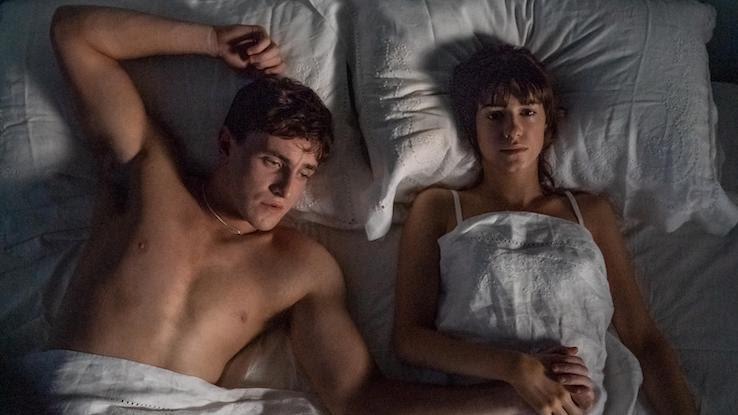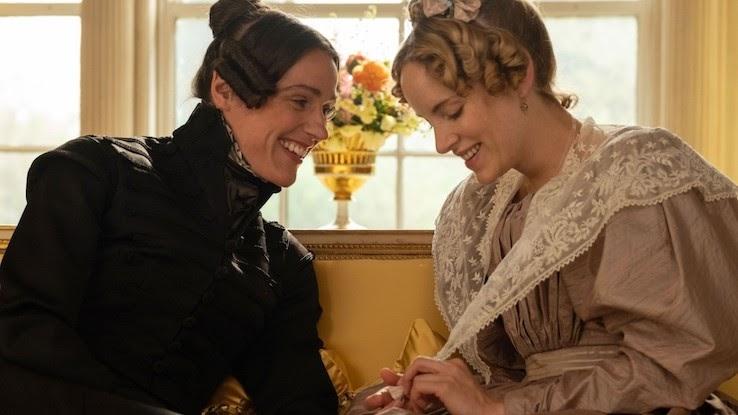
Like Winona Ryder, I too performed the 2020 spring-lockdown rite of passage of watching Hulu’s Normal People. I was awed by the rawness and realism in the miniseries’ sex scenes.
With Normal People came an awareness of other recent titles giving a verisimilar approach to their intimate content. I’m talking about Sex Education, Bridgerton and Gentleman Jack. This new treatment of sexual content reminded me of the infamous wedding episode in season one of Outlander and how it had been praised for its manifestation of the female gaze.
Shows like Normal People and I May Destroy You aren’t shying away from period sex, loss of virginity with some discomfort and consent as a continuous concept. But navigating these sensitive scenes with the level of nuance they need can require some special consideration. At the forefront of these scenes are their creators, writers and directors, of course. But there are also professionals called intimacy coordinators making sure there are proper procedures established on sets so that simulated sex can be captured and shown on the screen in the safest way.
Intimacy Coordinators as Intimate Content Choreographers
Ita O’Brien — intimacy coordinator for Normal People, Sex Education and I May Destroy You and a pioneer in the industry — likens her profession to that of a dance choreographer or a stunt coordinator. “An intimacy coordinator is a practitioner who brings a professional process and professional practices to the intimate content,” she says during a video chat interview. “[We’re] dealing with the intimate content in a professional way, with open communication, agreement and consent inherent within the process — and that’s of touch, of simulation of sexual content and of nudity. Whereas in the past, it was just like: ‘You’re an actor, get on with it.’

“We’re bringing techniques of where to hold. What body part to push into body part. What rhythm do we want to start with. What’s the journey through. What’s the culmination,” she adds about her work in choreographing intimate content. O’Brien says this kind of professional structure gives the performers the tools to do their work. The kisses can come freely and the actors can develop all their skills. They know they’re taken care of and there won’t be surprises or unwanted touching. Everything has been previously decided, rehearsed and agreed upon.
O’Brien also points out that intimacy coordinators help the actors in their process to discover how their characters would have sex. “This isn’t the person’s personal and private intimate expression. This is these characters. What’s the kind of movement that we need for these characters? You need practitioners who are going to bring that.”
When Are Intimacy Coordinators Necessary?
While not all film, TV or theater productions should have a use for an intimacy coordinator, O’Brien talks about the need to engage a professional if there’s any kind of intimate content. Even if it’s just a kiss.

“It’s never just a kiss,” says O’Brien. “Kissing is way more intimate and can be more challenging than a full-on simulated sexual scene. In a simulated sex scene, you have modesty garments covering the genitalia. It’s absolutely pretend. Whereas, actually, if you have to kiss lip to lip you are kissing lip to lip.”
Founder of Intimacy on Set, an organization that trains and works with professional intimacy coordinators, O’Brien has developed the Intimacy on Set Guidelines, a set of best practices when working with intimacy, simulated sex scenes and nudity. “When kissing, no use of tongues as standard practice,” read the guidelines. “However, should the director feel it would serve the scene better to use tongues, then there must be agreement and consent from both of the actors.”
This kind of structure and these types of safety guidelines provided by intimacy coordinators are not only being adopted in TV, although O’Brien admits long-form shows have more space and time to get in-depth with these explorations. Taking a look at O’Brien’s credits and those of some of her peers — like Bridgerton‘s intimacy coordinator, Lizzy Talbot, and The Undoing‘s Alicia Rodis — shows how TV is leading the way.
A Maturing Profession
While the industry moves toward embracing and adopting these professionals, O’Brien says she’s working with other pioneers in this line of work to have an outside accreditation so it’s clear who’s an accredited, experienced intimacy coordinator and who is not.

“I’m training practitioners across the globe. It’s really important that [in] the industry they make sure that the intimacy coordinators that they employ are trained, or under mentorship. There are many people now who are jumping on the bandwagon, looking at what we do, and thinking: ‘I can do that.’ Because it seems like there’s very little, but, actually, the job is incredibly complex,” she says.
Part of that complexity comes from the many people an intimacy coordinator has to serve in any given production. O’Brien insists their work is not only to serve the actors, but also the producers — who are the ones paying in the first place — and the directors. She explains how in Normal People she worked closely with director Lenny Abrahamson to ensure she was serving his vision and she didn’t miss one single bit from what was written on the page. Intimacy coordinators need to make sure sex is portrayed safely, without getting in the way.
In some of the TV shows and films I’ve watched recently, I almost could guess whether they’d worked with an intimacy coordinator or they’d just “winged” it.
“Through the work of the intimacy coordinator, we can bring more authentic and more detailed intimate scenes that help us have more realistic intimate content,” O’Brien says, and she recalls the Normal People episode in which Marianne (Daisy Edgar-Jones) loses her virginity. The sequence included a conversation about protection, consent and even showed the discomfort she first felt during intercourse.
At the end of the day, intimacy coordinators are also serving the viewer.






